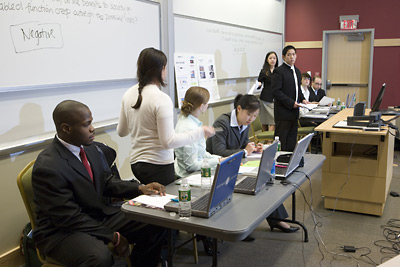Hotel students debate ethics of data management in era of information proliferation
By Linda Myers

In an era when people are asked to share such details as their mother's maiden name or how many siblings they have before they can make purchases online, what are the ethics of data collection and sharing?
Students must start thinking now about ethics and data management because they will certainly need to make decisions involving them in the workplace, said Assistant Professor Erica Wagner, who teaches Introduction to Information Systems, a required course at Cornell's School of Hotel Administration that enrolls about 120 students.
Wagner, a social scientist with a "critical perspective," said that even at Cornell, most students would rather be told what they need to do to get an "A" than push themselves to think critically. The course aims to change that -- as well as bring an ethical dimension to a technical subject.
This fall, Wagner asked her students to look at whether private-sector databases should be made available to enhance government security and whether the benefits of information technology (IT)-enabled "function creep" -- the use of data for purposes beyond those for which they were collected -- outweigh the risks.
"There's an increasing emphasis on IT-enabled personalized service and information-based strategy in the hospitality industry," said Wagner. "That can conflict with consumers' concerns about how their data are being used."
Randomly assigned to self-organized teams of 15 -- four debaters and 11 researchers, the students researched the issues using a special Web portal set up by a Cornell research librarian and then debated them in class.
For one class section's debate on security, Liam Biran '09, arguing for the affirmative team, declared: "Data mining isn't biased; it's a good thing. We can use it to prevent catastrophic events like September 11th."
"Does the government's responsibility to protect us supersede its responsibility to protect all our rights?" counter-argued Manuel Gilksberg '09, citing the government's surveillance of Jet Blue Airways' passengers without the airline's knowledge.
For the same class section's debate on function creep, Tanya Wong '09, arguing for the negative team, said she worried that sharing such personal data as her phone number with Web sites like Facebook or MySpace might expose her to a dangerous person.
In rebuttal Jennifer Freedman '09 called the threat of people's privacy being eroded "a scare tactic," dating back to George Orwell's novel "1984." "1984 has come and gone, and Orwell's predictions haven't come true," she asserted.
Following the debates, seven professionals serving on judging panels and the students themselves evaluated the teams on knowledge of issues and audience, arguments, facts, value of perspectives and teamwork. The final scores were close, with the negative and positive teams each winning one of the security debates and one of the function-creep debates.
"What ultimately made the difference was the debaters' ability to make the issues relevant to the audience and present the best solution for them," said Wong.
Panelist Adam Sternberg, who holds an MMH degree from the Hotel School and is a sales manager with Avero Inc., said: "The students conducted diligent research on their topics as well as their opposition's. Their thinking was impressive, and the debates were great for building real-world skills."
Panelist Tom Bruce, director of the Legal Information Institute at Cornell Law School, added, "It's heartening to see that Cornell students are learning not just the legalities but the ethics of data collection and use."
Wagner credited David Way in Cornell's Center for Learning and Teaching with helping her incorporate peer evaluations, considered a powerful pedagogic tool, in the debates and achieving her goal of teaching students critical thinking and evidence-based persuasion.
Said Wagner: "I see the students' growth over 14 weeks. By the end they have found their voices."
Linda Myers is a freelance writer.
Media Contact
Get Cornell news delivered right to your inbox.
Subscribe